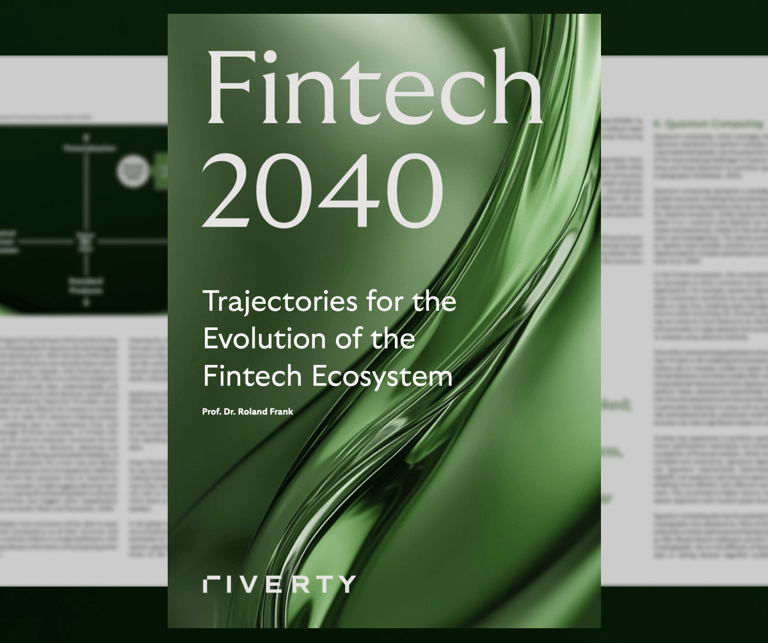Quantum encryption in finance: Building trust that can’t be broken
The digital trust that underpins our financial system is about to face its greatest challenge yet. By 2040, quantum computing will render today’s encryption methods obsolete, pushing financial institutions to adopt quantum-safe cryptographic protocols. For forward-thinking organizations, quantum encryption represents not just a defensive necessity, but a transformative opportunity to build unbreakable trust that empowers customers through human-centric security design that keeps you in flow while providing ultimate peace of mind.

At Riverty, we believe that the future of digital trust lies in conscious technology that functions as an invisible payment companion, protecting users seamlessly while promoting financial sustainability and inclusiveness through quantum-secured protection that builds lasting confidence without complexity.
What is quantum encryption?
Quantum encryption encompasses revolutionary cryptographic technologies that leverage the principles of quantum mechanics to create theoretically unbreakable security systems. Here’s how it works: Quantum Key Distribution (QKD) uses quantum particles – typically photons – to generate and distribute encryption keys in a way that makes any interception attempt immediately detectable.
Here’s what makes this different from regular encryption: quantum encryption is protected by the laws of physics themselves. Any attempt to observe or intercept quantum-encrypted data fundamentally alters the quantum state, alerting both parties to the security breach. Think of it as security that’s literally unbreakable – even future quantum computers won’t be able to crack it.
Post-quantum cryptography represents another crucial component of quantum-safe security. These mathematical algorithms are specifically designed to withstand attacks from both classical and quantum computers, providing a bridge to the quantum-secured future while maintaining compatibility with current systems.
Here’s the key difference: where traditional encryption creates complex mathematical puzzles that powerful computers can eventually solve, quantum encryption makes the very act of unauthorized access physically impossible – creating true peace of mind for financial institutions and their customers.
Why it matters: financial cyber threats are surging
Financial services firms face a cybersecurity landscape that grows more challenging every day. Recent industry analysis reveals that financial institutions are 300 times more likely to face cyber-attacks compared to companies in other sectors, with 63% of financial institutions reporting increased attack frequency in recent years.
The response? About a third of financial institutions have cranked up their cybersecurity spending by 20-30%. However, these investments in traditional security measures may prove insufficient as quantum computing advances threaten to undermine the cryptographic foundations of digital finance.
The “store now, decrypt later” attack strategy represents a particularly insidious threat. Cybercriminals are already harvesting encrypted financial data with the expectation that future quantum computers will be able to decrypt it. This means that sensitive financial information being protected by today’s encryption could be vulnerable within the next decade.
For financial institutions, the stakes extend beyond immediate financial losses to encompass long-term reputation damage and customer trust erosion. Organizations that fail to prepare for post-quantum threats risk finding themselves defenseless against a new generation of cyber attacks that could compromise decades of accumulated customer data and transaction records.
How quantum encryption will protect financial systems
Quantum encryption will revolutionize financial security across multiple layers of the industry’s infrastructure, creating comprehensive protection that empowers institutions and customers alike through human-centric security design that promotes confidence and peace of mind.
Transaction security: QKD will secure real-time payment processing between financial institutions, ensuring that transaction data remains protected even under quantum computing attacks. Take HSBC – they’re already testing QKD networks and proving this isn’t just theory anymore.
Customer data protection: Personal financial information, from account details to transaction histories, will benefit from quantum-level security that makes unauthorized access physically impossible. This creates unprecedented privacy protection that builds lasting trust between institutions and their customers.
Infrastructure hardening: Core banking systems, ATM networks, and mobile banking platforms will integrate quantum-safe protocols to ensure comprehensive protection across all customer touchpoints. This infrastructure-level security creates seamless protection that works invisibly in the background.
Advanced integration: The combination of QKD with blockchain technology and AI-powered security systems will create ultra-secure financial ledgers that maintain complete transaction integrity while enabling innovative financial services. This convergence represents the future of financial technology where security enhancement enables rather than restricts innovation.
The Monetary Authority of Singapore and Banque de France have already partnered with financial institutions to test QKD for protecting cross-border payment data, recognizing quantum security as essential infrastructure for the global financial system’s future.
Adoption challenges
While quantum encryption offers unprecedented security advantages, financial institutions face significant implementation challenges that require careful strategic planning and substantial investment.
Cost and complexity: Deploying QKD requires specialized hardware including quantum random number generators, single-photon emitters, and sophisticated detection systems. The global QKD market is projected to grow from approximately $2 billion in 2024 to nearly $8.94 billion by 2032, reflecting both growing demand and substantial investment requirements.
Technical infrastructure: Extending QKD across global financial networks demands careful coordination between fiber-based and satellite-based systems. Fiber-based QKD serves metropolitan areas and institutional connections, while satellite-based QKD enables long-distance communication despite higher implementation costs.
Regulatory coordination: Financial institutions must navigate evolving regulatory frameworks while implementing quantum-safe protocols. Collaboration with regulators ensures that quantum encryption adoption supports rather than complicates compliance requirements.
Strategic implementation: Rather than universal immediate deployment, successful quantum encryption adoption requires strategic prioritization. Critical systems and high-value data streams should receive quantum protection first, with gradual expansion as technology matures and costs decline.
Bottom line: you need quantum security that actually works in the real world, ensuring that quantum encryption implementations strengthen rather than disrupt existing financial services.
Impact on institutions and end users
For financial institutions: Quantum encryption offers powerful advantages in reputation protection and competitive differentiation through conscious security design that promotes trust and inclusiveness. Organizations that invest early in quantum-safe infrastructure will demonstrate security leadership that attracts security-conscious customers and partners while building lasting confidence. The ability to guarantee quantum-level data protection becomes a significant competitive advantage in an increasingly security-aware market that values transparency and user empowerment.
For end users: The benefits of quantum encryption will be largely invisible but profoundly important, functioning as the ultimate payment companion that works seamlessly in the background. Customers will experience the same seamless financial services they expect, but with the knowledge that their data enjoys physically unbreakable protection that promotes peace of mind and financial confidence. This creates lasting trust that encourages deeper engagement with digital financial services while reducing security-related anxiety, keeping users in flow with their financial lives.
Quantum encryption also enables new financial services that require absolute security guarantees while promoting financial sustainability and inclusiveness. High-value transactions, sensitive business financing, and privacy-critical financial planning become accessible to broader populations when all parties trust in quantum-level protection that doesn’t discriminate based on technical knowledge or financial status.
The future of trust in finance depends on technologies that make security both comprehensive and invisible, empowering users through protection they can trust completely while maintaining human-centric design principles that promote inclusiveness and financial sustainability for all.
The quantum-secured financial future
By 2040, quantum encryption will likely transition from cutting-edge technology to essential financial infrastructure. Financial institutions that begin quantum-safe preparations today position themselves to lead in a security-first digital economy where trust becomes the ultimate competitive advantage.
The transformation will be gradual but inevitable. Early adopters will demonstrate quantum security leadership while building customer confidence. As quantum computing threats become more immediate, quantum-safe institutions will offer security that competitors cannot match.
For organizations committed to privacy and security in AI tools and data protection in invisible banking, quantum encryption represents the natural evolution of security technology that enables rather than restricts financial innovation.
At Riverty, we’re building toward this quantum-secured future through human-centric security design that empowers users while providing unbreakable protection. The result will be financial services that combine maximum security with effortless user experiences, creating trust that can’t be broken.
Explore the future of digital trust in finance and discover how quantum encryption will reshape financial security. Download the Fintech 2040 whitepaper to see what's next for unbreakable financial trust.
Shape the future of finance: Download the complete analysis
Download the Fintech 2040 Whitepaper to discover what's shaping the future of banking and how your organization can stay ahead of the disruption.

